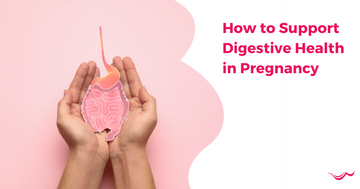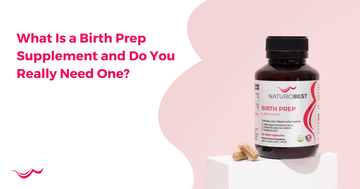How to Support Digestive Health in Pregnancy
by NaturoBest Naturopath Team on Jan 05, 2024

Pregnancy can disrupt digestive health and lead to uncomfortable symptoms such as reflux, constipation, nausea, and irregular stools. So it's a good idea to optimise your gut health in pregnancy to have a smooth journey.
Our Top Naturopathic Tips for Better Digestion While Pregnant
- Support stomach acid and bile production for healthy digestion.
- Herbal teas can help ease reflux in pregnancy.
- The gut microbiome plays an important role in digestive health.
- Manage stress for optimising digestion.
- Minimise processed foods that can disrupt gut health in pregnancy.
Support Stomach Acid Production to Improve Digestion
Your stomach acid plays an important role in digesting food. Stomach acid and digestive enzymes help to break down proteins. While the stomach muscles churn food and turn it into a liquid consistency for further digestion in the small intestine.
Stomach acid is secreted in the stomach when our body stimulates it to do so. This occurs when you smell, look at, or taste food and your brain tells your stomach food is coming.
When you are busy or stressed, your brain may be in a sympathetic nervous system state instead of a rest and digest state.
This can lead to low stomach acid secretion and impact your digestion in many ways, contributing to constipation and reflux.
You can support your stomach acid and digestive secretions before meals by having a small shot of apple cider vinegar or lemon juice 10mins before a meal.
Improve Bile Production for Healthy Digestion
Bile is important for fat breakdown and absorption of fat-soluble vitamins. Your liver produces bile and our gallbladder ‘concentrates’ it. Bile acts as a natural lubricant in the bowel, assisting regular bowel motions.
Optimising liver health is important to optimise our bile production for digestion. You can support bile production and liver health by eating bitter greens like rocket and other foods like beetroot, turmeric, and cruciferous vegetables in pregnancy.
Managing Reflux in Pregnancy
Reflux is a common digestive complaint in pregnancy. Reflux can occur from the pressure that the baby puts on your lower oesophagus and digestive system. This means it is often unavoidable.
Herbal teas such as chamomile or marshmallow root may be helpful, and using slippery elm powder may provide relief too. You may also benefit from supporting your stomach acid and bile production for food breakdown with the above tips.
Importance of the Gut Microbiome in Pregnancy
You probably already know that the gut microbiome plays an important role in your overall health and wellbeing. The gut microbiome is needed for optimal digestive function and healthy bowel motions too.
According to a study done in 2022, the gut microbiota during pregnancy changes profoundly. During this period, the imbalances and changes to the microbiome in pregnant women is related to a variety of diseases in pregnancy. Including pregnancy-specific gastrointestinal diseases, such as pre-eclampsia, ICP (cholestasis), morning sickness and constipation during pregnancy.
Including a variety of different fibres from fruit, vegetables and wholegrains is a great way to support your gut microbiome in pregnancy.
Increasing polyphenol rich foods like dark chocolate, pomegranate, blackberries, and olives is also another good way to feed your beneficial flora.
The mother’s gut microbiome has been shown to affect the growth of the offspring in the prenatal and postnatal period and is important in their health later in life.
Minimise Stress & Processed Foods to Improve Digestion
To support digestive function in pregnancy, it is important to minimise processed foods and opt for whole, organic foods. Things like lollies, fried foods, white bread, and pastries can worsen reflux, constipation, and microbiome health. Whilst you can still enjoy small amounts of them on an occasional basis, it is best to avoid these foods on a daily basis.
Stress is just as important as what we eat when it comes to our digestive function. Our digestion starts in the mouth; adequate chewing of our food and enzymes in our saliva start the breakdown of carbohydrates. When we are stressed or busy, we may not chew our food properly which impacts our digestion.
Stress can reduce our stomach acid and digestive enzymes. This can lead to constipation, nausea, and reflux. It is ideal to eat slowly in a calm, quiet environment if possible. Taking 3 deep breaths before eating a meal mindfully can help.
Improving Digestive Health in Pregnancy
Supporting stomach acid and bile production will promote healthy digestion. If you're experiencing reflux, implement our tips to optimise stomach acid and use herbal teas.
Remember, the gut microbiome plays an important role in digestive health, and increasing microbiome diversity through diet is recommended.
Manage your stress and minimise processed foods to maintain digestive health in pregnancy.
Pregnancy can disrupt digestive health and lead to uncomfortable symptoms such as reflux, constipation, nausea, and irregular stools. If you're looking for extra support, our Calcium & Magnesium Plus K2 & D3 powder contains magnesium citrate. This may assist with regular bowel motions and also stress which may impact your digestive health in pregnancy.




